In Deciding How Much Of A Role The Guest Should Play In Co-producing An Experience,
Main Body
Chapter 13. Careers and Work Experience
Micki McCartney and Lynda Robinson
- Identify and define the steps in career planning
- Identify aspects of labour market information
- Compare and describe types of work learning experiences
- Describe tools and strategies to successfully complete work experience
- Explore career management strategies for workplace success
- Review industry career profiles and professions for common themes
Overview
This chapter is divided into three parts. First, we'll learn the essential steps of career planning. Then we'll take a look at the types of work experience you can engage in while still at school. Finally, we'll explore how you can integrate your planning with your education and experiences, and we'll hear from graduates who have been successful in their career choices.
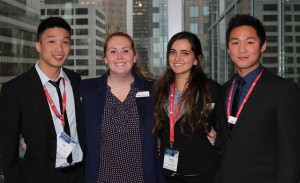
Let's start with a review of the essential steps in the career planning process.
Career Planning
Shepard and Mani define career planning "as an ongoing process through which an individual sets career goals and identifies the means to achieve them" (2013, p. 14). It is through career planning that a person evaluates abilities and interests, assesses values and personality, considers alternative career opportunities, establishes career goals, and plans practical developmental activities.
Career planning requires individuals to understand themselves and their values, interests, and skills. It is also an ongoing process, one that must be repeated with changes in employment and life circumstances. As you gain more experience and knowledge, the process will begin anew.
This section reviews the five essential steps of career planning, which are based on our research and input from industry experts:
- Conduct a self-assessment
- Research the labour market
- Create your career search toolkit
- Put your career campaign into action
- Engage in networking
Let's start at step one.
Step One: Conduct a Self-Assessment
Self knowledge is the key to choosing a career. It can be overwhelming to begin the process of self-assessment. However, if done well at the start, the likelihood of securing work that has meaning, purpose, and fulfillment is far greater. Understanding your preferences, knowing your strengths, and honestly facing the areas you need to develop are the first steps for effective self-assessment.
Take a Closer Look: Tourism Careers from the CTHRC
The Canadian Tourism HR Council (CTHRC) has a website that can help you explore career options. Start with its "tourism career quiz" to see where you might find a fit, and browse the list of job boards and other resources. Check out these Tourism Career Resources: http://www.cthrc.ca/en/resources/tourism_careers
Rosenberg McKay (2014) identifies self-assessment as "the process of gathering information about you in order to make a knowledgeable career decision" and adds that "a self-assessment should examine values, interests, personality, and skills" (¶ 1). Your values should guide your decision making to ensure a good fit for both you and your employer.
Take a Closer Look: Explore Careers by Skills and Knowledge
The Government of Canada Job Bank website allows you to peruse occupations and explore the skills and knowledge required to work in these fields. Discover what jobs might be a good match for you at the Government of Canada Job Bank: http://www.jobbank.gc.ca/es_all-eng.do
Many people find that over the course of their post-secondary program they naturally become more self-aware. It's recommended, however, that you take time to do the following in order to facilitate your understanding:
1. Think back to when you were a child. What hopes and dreams did you have for yourself? How have these changed?
2. Develop a profile of your personality type. One helpful way of classifying personalities was developed by Myers and Briggs. You can learn more about their personality types by visiting their foundation at Myers and Briggs Personality Types: www.myersbriggs.org/my-mbti-personality-type/mbti-basics/.
3. Do an internet search for terms like personal value statement and find examples that inspire you. These may include key words such as loyalty, accountability, determination, and passion. Now create your own unique statement that reflects where you are today.
4. Gain a better understanding of yourself by learning how others see you. Ask a close friend, family member, or trusted academic contact to write down 10 key words that describe you. Notice where these are different or similar to the words you chose for your value statement.
5. Go back to the introductory chapter of this textbook and make note of the five key sectors of the tourism industry. With a highlighter or similar tool, choose the two sectors that are the most appealing to you. Why are these of interest? What life experiences or work experience do you have that apply to these sectors? How do they align with your personality type and values?
With this foundation in place, you're ready to face employment reality by gaining a greater understanding of the labour market.
Step Two: Research the Labour Market
Whether you are career planning for the very first time or you are trying to change careers, gathering labour market information is necessary to ensure your education and training are relevant. Keep in mind that a career is distinct from a job. A job can be a part-time or short-term position, whereas a career is work you plan to explore for the length of your professional life, with each employment opportunity building on the last.
Learning as much as you can about careers within the tourism and hospitality industry will allow you to make good decisions about your future. Some of the activities you can do to complete your research include visiting job boards to identify demand and following companies and sectors in the media. Let's look at these concepts in more detail.
Visit Tourism and Hospitality Job Boards to Identify Demand
It's not enough for you to want to work in a certain field — you have to know what types of jobs are currently being offered. By visiting job boards you can get a sense of which geographic areas have more opportunities, how much different jobs pay, and what kind of experience is required.
Websites you can use for this search include:
- The go2HR job board for tourism and hospitality jobs in BC: www.go2hr.ca/jobboard
- Hospitality Works (H Careers): www.hcareers.ca
- HotellerieJobs: www.hotelleriejobs.com/en
- Your local Craigslist classified listings: www.craigslist.org/about/sites
- Listings specific to resort communities (e.g., Whistler: Whistler Job Board: http://whistlerchamber.chambermaster.com/jobs)
- Career pages for companies like Fairmont Hotels Careers (www.fairmontcareers.com), and JOEY Restaurants Careers (http://joeyrestaurants.com/careers/)
Make note of any interesting positions, and pay attention to gaps. Compare this to your self-assessment. Where are the opportunities lining up? What changes might you have to make to advance your career? For example, if you'd like to stay in the same city, but see no jobs posted that match your needs, it might be time to look elsewhere.
Follow Companies and Sectors in the Media
Make it a point to follow companies and sectors of interest to you in the media. You can do this by using a search engine to set up notifications (e.g., Google Alerts) about sectors (e.g., restaurants, ski resorts), and following companies on social media (Twitter, Facebook, LinkedIn, Instagram). You can also monitor news from industry associations to read their commentary on issues and trends affecting specific sectors of the industry and/or geographic regions. This will help you identify growth patterns, understand job market trends, and gain an edge should you have the opportunity to interview.
With this information in hand, you'll be ready to create a plan.
Spotlight On: The go2HR Job Board
The job board hosted by go2HR is your one-stop shop for tourism and hospitality jobs and careers in BC. Search by geographic region, keyword, and more. For more information, visit the go2HR Job Board: https://www.go2hr.ca/jobboard
Step Three: Create Your Career Search Toolkit
You have completed your initial research, and now you need to get down to business! This step involves getting ready to approach employers about specific opportunities.
Identify, and be prepared to provide evidence of, the attributes and skills you possess that would be attractive to an employer. It can be helpful to review these in three categories:
- Personal attributes: describe what you are like as a person/employee (e.g., your values, personality type, personal qualities, and characteristics)
- Technical skills: skills and knowledge required to perform specific work (e.g., how to use restaurant Point-of-Sale systems, hotel reservations systems, or other computer software)
- Transferable skills: skills required to perform a variety of tasks that can be transferred from one type of job to another (e.g., the ability to read a balance sheet and prepare a budget)
Use the list of your skills and attributes when you describe yourself in your documents.
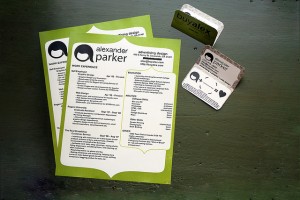
A standard set of job search documents includes:
- Cover letter: a long-form document of one page that tells a story, illustrating how your skills and experience make you an ideal candidate for the job.
- Resume (sometimes called a curriculum vitae or CV): a point-form document, typically two pages, that includes your career objective, relevant experience, education, skills, and interests.
- Reference list: identifies three or four professional contacts who have worked with you, and can vouch for the quality of your work.
Be sure to update these documents each time you apply for a position and customize them to the opportunity at hand.
You may also want to consider using social media tools and resources to promote yourself. This may include creating a LinkedIn profile, making a professional (rather than personal) Facebook page, and using Twitter and Instagram to communicate with companies. Some job seekers also use a professional e-portfolio to demonstrate their skills, knowledge, and abilities. Showcasing your experiences with an e-portfolio is one way to stand out from other applicants (Lorenzo & Ittleson, 2005).
Take a Closer Look: E-portfolio Tools
This list, updated regularly, was created by EPAC, the Electronic Portfolio Action & Communication listserv. It provides access to a range of tools for creating e-portfolios with links to key websites. Before using a specific tool, be sure to check with an instructor to see whether your program has recommended e-portfolio platforms at its disposal. To view the list, visit E-portfolio Tools: http://epac.pbworks.com/w/page/12559686/Evolving%20List%25C2%25A0of%25C2%25A0ePortfolio-related%25C2%25A0Tools
Step Four: Put Your Career Campaign into Action
Now it's time to make a list of companies to target, and to approach them.
We've already addressed how you can find opportunities by scanning postings on websites like the go2HR job board. This is a great start, but most work opportunities are found in the hidden job market, which consists of jobs that are not advertised or made public in traditional ways. Many individuals find work in BC's tourism and hospitality industry by being referred, getting hired by someone they already know, or starting at an entry-level position and waiting for future growth opportunities.
If you don't have any connections in tourism and hospitality, make them! List all the organizations you're interested in working for. Now find some key contacts to meet with. These might be:
- The person responsible for hiring within the organization (as noted on its website or in its directory)
- An alumni from your program already working for the company (ask a faculty member to connect you)
- The person who currently works in your ideal role within the company
- A personal contact (family member, friend, or acquaintance) working at the company
Approach your potential contact to set up an informational interview. This is a session where you make contact with individuals who can use their first-hand experience to educate you about a particular role or company.
Write a short script that will help you remain focused and appear professional as you embark on your first call or send an initial email. Here's a sample:
I have five years' experience working in the tourism and/or hospitality field, mainly holding front-end positions. I have increased return visitor numbers and received continuous feedback about my outstanding customer service focus. I am wondering if you have 10 minutes to speak with me.
Your script will change depending on who you are targeting. Prepare a list of questions you want to ask. Remember, at this stage, you are not asking for a job; you're asking for advice and gathering information. Don't ask obvious questions about information already available on the company's website or in its print material. Some questions might include:
- What are three words you would use to describe the culture of this company?
- In the time that you've worked here, would you say the company has grown? What has changed? What has stayed the same?
- What is a day-in-the-life of someone in (name a role) at this company?
- What salary range is available for entry-level employees?
- What types of training and career path support is offered to employees?
- Are there any other people I should be talking to about this? If possible, could you give me their contact information or introduce me to them?
The conversation should be professional but informal in nature, and many of your questions will be answered in the natural flow of the conversation. Take notes as you move through the interview, and take a minute after the interview to fill in details you may have missed while you were there.
After the session, always send a thank-you note. Thank the person for his or her time, and add something specific you learned in the interview that you believe will be helpful as you navigate your career. Sending an email thank-you is fine, but sending a written card will help you stand out.
If you're given the name of someone else to contact, or you are asked to provide further information, be sure to follow through. This is your opportunity to make a good impression on your contact, and the organization.
Step Five: Engage in Networking
Developing your professional network as an emerging professional in tourism and hospitality is essential. Just as you need to continue to learn and develop your skill sets, you need to develop and nurture your network; it's an investment in your future. Some ways to do this include:
- Conducting multiple informational interviews (covered in the previous step)
- Maintaining contact with academic classmates/faculty
- Attending and presenting at conferences
- Participating in case study competitions and other academic contests
- Using social media networks and groups
- Maintaining good relationships with coworkers at your current job, and staying in touch with people when they leave
- Asking family and friends to introduce you to tourism and hospitality professionals in their network
Remember that networking is equally about who you know and who knows you; it works both ways. Be generous with your contacts, information, and resources. As a new professional, you may not have a developed network, but you can offer your great attitude and valuable ideas, and you will soon gain a reputation as someone who contributes to the field.

Now that you have a sense of the steps needed to plan your tourism or hospitality career, let's have a look at an important tool: work experience, which you can gain while still at school to propel you to your ideal career much faster.
Work Experience
Experiential learning is "based on students being directly involved in a learning experience rather than being recipients of ready-made content in the form of lectures" (ContactPoint, 2014a). Experiential learning is:
- Action-oriented
- Learner-centred
- Geared toward process, rather than outcomes
In this way, knowledge is created as the learner moves through the experience.
Through your educational program, you may be able to participate in a variety of different learning experiences in tourism and hospitality. Students who participate in a learning experience outside of the classroom are more likely to enter the field with both academic and practical workplace skills and knowledge, and have more opportunities for career advancement.
Let's have a look at some of the common types of work learning experiences:
- Co-op education
- Internship
- Practicum
- Service learning
- Volunteering
Each of these is defined below.
Co-op Education
Co-operative, or co-op education refers to "a structured program that integrates work experience in a student's field along with academic studies by alternating in-class learning with periods of actual work" (ContactPoint, 2014b, ¶ 1). The term reflects the co-operative relationship between students, schools, and employers.
Internship
An internship is a temporary on-the-job experience that is "typically offered to students or inexperienced workers" (ContactPoint, 2014c, ¶ 1). It is generally project-oriented, and supervised.
The intern should have specific learning goals against which he or she can apply experience about a particular industry or field of work. The term may be paid or unpaid, and may lead to permanent career opportunities with the organization (ContactPoint, 2014b).
Practicum
A practicum is "applied learning that provides students with practical experience and interaction with professionals from industry and the community outside of school" (ConnectEd, 2011, p.3). The goal is to support career readiness and help enhance:
- Higher-order thinking
- Academic skills
- Technical skills
- Applied workplace skills
The experience may be paid or unpaid.
Service Learning
Service learning is defined as a course-based, credit-bearing educational experience in which students:
- Participate in an organized service activity that meets identified community needs
- Reflect on the service activity to gain further understanding of course content, a broader appreciation of the discipline, and an enhanced sense of civic responsibility (Bringle & Hatcher, 1995)
Volunteering
Volunteering involves performing a service without pay in order to obtain work experience, learn new skills, meet people, contribute to community, and contribute to a cause that's important to the volunteer (for example, helping animals, supporting elderly people, working for an environmental cause) (Pickerell, 2014).
Benefits of Work Experience Programs
Students who have completed a formal work experience component benefit from a supportive partnership between the educational institution, the employer, and themselves. This partnership encourages community stakeholder investment, student learning opportunities, professional networks, as well as opportunities for employers to participate as co-educators.
Some institutions may work with an experiential education coordinator to ensure a particular position meets the school's criteria. Depending on your program, remuneration for work can be by the hour, by salary, by a stipend, as in-kind contributions (experiences or services from the business), or as a volunteer assignment. The educational institution may monitor your placement and ask you to complete an assignment where you reflect on the work experience. Some programs may have an evaluation component and a supervisor who supports the student's learning. Students are also evaluated by the employer, and they will have a supervisor whom they report to directly.
Most often, for students to participate in a work experience program, they are required to maintain a certain grade point average (GPA) set by the school. Often students are also asked to establish learning goals prior to starting their work experience.
If your program doesn't offer a formal work experience program such as a co-op, internship, or practicum, you can still gain valuable hands-on learning through part-time work and volunteer opportunities. Because tourism is the number-one employer of youth in BC, you can find a part-time job to develop your skills and gain an entry-level opportunity to join the industry.
Whatever experience you engage in, be it formal, or informal, it's important to:
- Explore your employer's organizational culture and social norms
- Do your best on the job
- Gain conflict management and resolution skills
These three keys come directly from BC tourism and hospitality employers (LinkBC, 2014), and are explored in the next section.
Integrating Planning with Education and Experience
The final career planning element we'll explore in this chapter involves integrating your education and work experience. By applying classroom learning to the field, and then bringing lessons from your workplace back to the classroom, you can see key concepts in action.
Research Organizational Culture and Social Norms
Each organization has its own culture and social norms. Organizational culture refers to "the customs, rituals, and values shared by the members of an organization that have to be accepted by new members" (Collins English Dictionary, 2012), and is expressed through its mission statement, vision, beliefs, language systems, and processes. Social norms refer to the way individuals in the organization interact, communicate, and generally behave with each other.
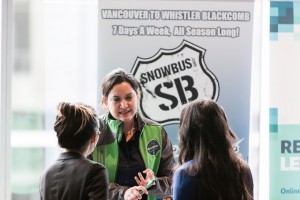
You will want to understand the culture of an organization before applying for a job there to ensure your values are congruent. Find out what's important to the organization by researching the business. How does it present its public face?
Asking questions of a potential employer about the organization's culture will help you assess whether it is a good fit for you. You can do this by asking employees in the organization during the informational interview; or alternatively, in a formal job interview.
Performance on the Job
This is your time to shine — no matter what role you've been assigned. In addition to respecting and working within a company's culture, once you start your position, it's time for you to show initiative (Iannarino, n.d.). Demonstrate an interest in learning and contributing to the organization's goals and objectives and you will stand out from other employees.
Act without waiting to be told what to do and persistently follow through on work responsibilities, regardless of the obstacles. Think about ways to improve operations, and come up with new ideas, while presenting these in a way that shows you respect management's expertise. It's up to you to signal to your employer that you're someone who can be counted on and you have leadership potential. Some ways of showing initiative include:
- Asking to observe a meeting
- Asking to shadow a manager in another department
- Reading through company policies and plans, and asking questions about them
- Offering to bring your skills to the table to make a difference, such as setting up a social media account for the company or creating a training manual for future students in your position
Often, you'll be able to take advantage of project work at school to accomplish some of the above.
Practise Conflict Management and Resolution
The majority of tourism and hospitality employers stress that conflict management is an essential skill in this customer-service driven industry (LinkBC, 2014). It's up to you to practise these skills at your workplace.
In most conflicts, the ultimate goal must be to find a resolution. Avoiding or ignoring conflict is not an effective strategy. While resolving conflict can be uncomfortable, unresolved conflict actually makes the situation worse. Generally, conflicts have more than one cause. How you choose to resolve conflicts will ultimately demonstrate your ability to be professional and move upward in your career.
Consider the following three steps to resolving conflicts both at work and in the classroom.
Listen
If at all possible, try not to take the situation or comments personally. Do not make assumptions about people's motivations. Jumping to conclusions adds to the conflict and creates more tension and issues to work though.
Consider that if there is a conflict, you might not have fully understood the issue or your part in it. While you may not like the style or approach of the person you're interacting with, set the goal of listening with acceptance with the intent to resolve the conflict. Convey that you are listening respectfully through your body language and tone of voice, and don't interrupt. If there are several people involved, let everyone have a chance to speak.
Reflect and Summarize
If you need to, silently count to 10 in your head to give yourself the time to respond appropriately. Acknowledge your commitment to resolving the conflict, and clarify how the other person is feeling about it. When people feel listened to, they are often willing to take the first step toward trust, which then creates willingness to work through the issue. Summarizing what the other person has said allows you to ensure that you've fully captured his or her position.
Focus on appreciating what the other person is saying and thinking to understand the source of conflict. Ask what the other person believes would resolve the conflict. Focus the conversation on mutually resolving the issue.
Respond
Allow each person the opportunity to explore solutions equally. Take a break from the process if you need to, and come back to the conflict when you feel refreshed. Often the solution is through compromise, because no one is all wrong or all right in any given situation. Each time you're given the chance to respond, do your best to keep language neutral.
By maturely moving through the process of listening, reflecting, summarizing, and responding (and sometimes going back to the start again), you'll not only demonstrate your workplace potential, but gain valuable skills for your personal life.
While adapting to organizational culture, demonstrating strong on-the-job performance, and practising conflict resolution are important, there are many skills to be learned in the workplace. Others include the ability to apply critical thinking, acting as a global citizen, and working as part of a team. With this in mind, let's have a look at success stories in our industry — graduates who possess these skills and attributes, and have used them to propel their careers forward.
Tourism and Hospitality Success Stories
Just a few years ago the professionals highlighted in this section were students in the classroom. Here, they tell us first-hand what you need to know in order to grow in BC's tourism and hospitality industry. These success stories span the following sectors:
- Accommodation (account manager, rooms division coordinator)
- Recreation and entertainment (project coordinator, conference services manager, entrepreneur and small business owner)
- Travel services (long-range planner, travel designer, industry and communications services manager)
As you read their stories, you'll see that many of the themes explored in this chapter are echoed in their advice. Please note that these profiles were current as of spring 2015 – some of these grads may already be on to the next big thing in their careers!
Accommodation
Brock Martin, Account Manager

Brock manages accounts for Canada Booking.com Online Reservations Inc. He graduated with a bachelor of hospitality management at Vancouver Community College in 2010. Brock says:
I oversee more than 300 accommodations on Vancouver Island and am their point of contact for day-to-day support and for assisting them in maximizing their listing's potential with Booking.com. When I moved to Vancouver in 2004, I started my first hotel job at the Westin Bayshore as a banquet server. I still remember my first day; we had to serve a dinner for over 1,200 people, and I remember that despite how crazy it was I knew this was the industry for me!
From there, I moved to the Pacific Palisades Hotel in banquets, and then I was given an opportunity to move to the front desk. I remember thinking at first that I didn't belong at the front desk as I had always just done food and beverage. I did not think I would fit the position. Well, I was wrong! I immediately knew I loved the interactions with the guests.
I progressed with my career, moving from a front desk agent to an assistant front office manager, where I stayed until the hotel unfortunately closed its doors in 2010. Following the Palisades, I held various front office management positions with Coast Hotels and Delta Hotels in Vancouver, Nanaimo, and Whistler. In 2013, I was presented with an opportunity to join Booking.com as an account manager, where I am presently working.
Taking courses related to hospitality management and tourism will really assist in developing your career. Once in a workplace setting, continued education is key. Look for opportunities for cross training and job shadowing, and ask Human Resources about internal training programs to further your understanding.
Students entering this industry need to have a passion for guest services and for helping people. They need to be able to think quickly and be a good problem solver. This is a fast-paced, ever-evolving industry and doesn't fit someone who likes routine. No two days are ever the same, and that is what I love! Remain flexible and do not be afraid to try new things. Have an open mind and challenge yourself to think outside of the box.
Specific things students can do to get ahead include networking, further training, and volunteering. Remember, the industry is very large, yet small at the same time. Take opportunities to volunteer as these are great networking opportunities as well. I couldn't picture myself in any other industry. It is challenging, yet rewarding, and best of all, it is a lot of fun!
Katie Clarke, Marketing Coordinator
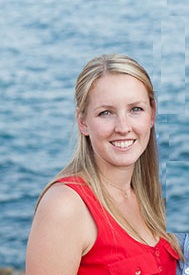
Katie works at the Parkside Hotel & Spa in Victoria, BC. She graduated with a diploma in hospitality management from Vancouver Island University in 2011. Katie says:
My initial hotel job was with the Fairmont Empress housekeeping department during my first co-op work term, a temporary two-month position after which I returned for my second year of schooling. After graduating from Vancouver Island University, I completed my last co-op semester by working at the Queen Victoria Hotel and Suites as a guest services agent. My employment continued there after my co-op term was complete, and lasted until the hotel was sold in October 2012. I left with a wealth of knowledge in guest services.
I began working at the Parkside Hotel & Spa at the time it was purchased by a group of Vancouver Island local investors. I started in reservations, which was a new department in the early stages of development, and my skills and qualifications played a large role in assisting with the department's foundations. I worked as a reservations agent for seven months before I was promoted to the position of rooms division coordinator. In this position, I assisted in supervising the department, as well as taking on some marketing responsibilities such as keeping the hotel website up-to-date, social media, print materials, and much, much more. The role became a jack-of-all-trades position and was a great experience! In fact, I used what I learned in that role to obtain my current position of marketing coordinator.
My advice for students is that any related education will always help get your foot in the door of a hotel. All applicable work experience, skills, and knowledge can also be an advantage. If you are a hard worker, a team player, and willing to help out when other departments need it, you will be successful in any job you do.
Students should understand that the hospitality field can be a career. Some people view a job in the hospitality industry as temporary or seasonal employment, but it can be a career with many exciting opportunities if you stick with it. The great thing about working in a hotel is that there are so many different departments to explore. The options are endless.
Networking can provide an advantage in this industry. If you contact your tourism bureau, it can connect you to organizations to help you further your industry network. Creating great workplace relationships also fosters getting ahead in any industry. Be sure to keep up with new training and volunteering, as that can be a great advantage, and most workplaces encourage it!
Though every job will come with its tough days, push past them as there are so many better days ahead! Work hard and it will pay off!
Recreation and Entertainment
Ana Rowinska, Project Coordinator
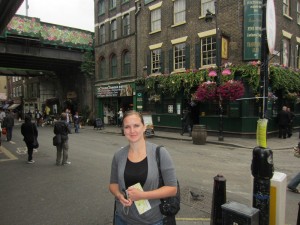
Ana works for MCI Group Canada. She has multiple credentials including a hospitality restaurant management diploma from Douglas College (2005), an Event Marketing Association certificate from BCIT (2008), and a bachelor of tourism management from Capilano University (2013). Ana says:
My love for travel and hospitality were key reasons I took the hospitality restaurant management diploma program at Douglas College. After receiving my diploma, I decided to focus on event marketing and enrolled at BCIT for further training.
Students interested in getting into events and or event marketing need to be able to multi-task, be organized, and have a hard work ethic. Both education and experience are important to work as an event coordinator. You need to know the ins and outs of the industry by working in events, and you also need to understand the back-end strategies of how to implement, organize, and plan events.
The events industry is not your typical nine-to-five job. Long workdays are common, and you can expect to sometimes work 16 or more hours in one day to get the job done. Events can happen any day of the week, at any time. Commitment and the ability to be flexible is key as you are always the first one on scene and the last one to leave. You need to have patience, be organized, and be able to deal with stress.
Many students expect to be hired at at a high level right after graduation, but in truth, most will be entering the workforce in their respective fields in an entry-level position. You'll need to be prepared to work toward gaining experience with your company before you can move into a supervisor or manager position. My advice is to work hard, learn, and ask questions, and you will succeed.
Volunteering or working part time with events is key as you will not only gain valuable industry experience, you will also be networking with your future peers. Experience is invaluable in our sector, so the more events you work or volunteer in, the more opportunities you will have to expand your network and meet key stakeholders in the event industry.
To be successful, you need to be organized, have excellent communication skills, and be able to handle stress and pressure. Don't get discouraged if things don't happen exactly like you planned; life throws you curve balls, and it's how you deal with those curve balls that allows you to succeed in our industry.
Throughout my career, I have needed to make decisions on what was next for me. You never know which job may lead you to where, so treat each job as a stepping stone to move ahead in your career.
Christine McCann, Senior Conference Services Manager

Christine is in senior management at the Fairmont Chateau Whistler. She graduated from the Douglas College program in hotel and restaurant management in 2006. Christine says:
I started at the Fairmont Chateau Whistler as a SWEP (student work experience) student in the banquet department. From there, I became very interested in the organization and execution of events, weddings, and conferences. During my time as a banquet server, I was able to cross train with conference services, allowing me to gain insights into the skills and knowledge required to be a successful member of the that team. When a position opened up for a conference services coordinator, I was overjoyed to receive a role as part of this fantastic team! Seven years have passed, and I am now in the position of senior conference services manager, taking care of many large groups throughout the year.
Event and conference planning is a very interesting blend of roles: being on the floor with clients and groups but also completing many administrative tasks and paperwork to ensure plans are effectively communicated. A positive attitude, passion for creating outstanding events, and an eye for detail are three key qualities needed. Members of my team have moved here from many other departments, including banquets, front office, sales, and food and beverage; however, having a base of operations experience is the normal pathway to a position in conference services.
Being successful in a conference services role takes passion and an understanding and appreciation for the guest experience. We are ambassadors for our brand to our guests — 100 to 1,000 guests at a time — and it is important that we ensure each one feels a special connection to our venue and location.
A positive attitude, willingness to learn and passion for whatever role you choose will always help you on the road to success.
Volunteering is a fantastic way to try out new roles and meet great contacts. Hands-on experience can be invaluable in the future. Continuing to seek knowledge, through training, education, industry events — whatever method is interesting for you — will also be beneficial.
Love what you do, work hard, and listen!
David Woolridge, Entrepreneur and Small Business Owner
David is the owner and founder of Ridge Wilderness Adventures Ltd. He graduated from the outdoor recreation management program at Capilano University in 2002. David says:
I love people and I love being outside, so I searched for positions that would fill that need. I have worked at canoe rental companies, guiding outfits, first-aid schools, retail shops, construction, and anything else that I could get my hands on.
I recommend students get into the field by one of two means: enter a specific program like the one at Capilano University, or contact a company that does the work they would like to do and apply. If applying directly doesn't work, ask the company what it is looking for in a person to be employable.
This work is for those who don't like to have a fixed routine and who thrive on problem solving and like to do different things all the time. If you prefer a set schedule and set pay, it is probably not for you.
It's an amazing job where we get to work at what we love. To succeed in this line of work, attitude and availability trump aptitude. If you would like to have a lucrative career in the outdoors, you need to possess an outgoing, friendly, hardworking attitude. This style of work is not nine-to-five; in fact, it's the opposite of that. Your ability to work when the work is there is key to success. Obviously, you need to have the ability to do the work, but 9 times out of 10, if that's all you have you will not succeed.
This industry is all about the people that you know. Go to every event and course you can to meet people and get known. Most places will give you the training; you need to do the work if your attitude is right, so sort out what you need before you start.
If you love the outdoors, love people, and want to have fun for work, this is what you should do.
Travel Services
Cleopatra Corbett, Long-Range Planner

Cleopatra works as a planner for the City of Vernon. She holds a bachelor of tourism management from Vancouver Island University (2004) and completed the urban design certificate at Simon Fraser University in 2012. Cleopatra says:
My first experience in community planning came during my third-year co-op work term as a planning assistant with the District of Ucluelet. I instantly fell in love with the profession: working with local residents, businesses, non-profits, and elected officials to realize a desired future for the community. Upon graduation, I continued to work in Ucluelet, followed by Tofino, Golden, and now Vernon, all in British Columbia.
In my field the desired skill set includes planning, communication, collaboration, facilitation, public speaking, and report writing. For knowledge, you need planning history and theory, community development, environmental stewardship, marketing, and statistical and research methods. As for education, you want to study planning, geography, urban design, tourism, recreation, history, and law.
Community planning is incredibly challenging and rewarding work. Put simply, your work can have a tremendous impact on the environment and the quality of life for residents in your community. You help the community dream about a desired future and then develop policy to make it happen.
My advice would be to have mentors you respect and admire, and to meet with them regularly to ask questions and look for advice. Always do your best, work hard with integrity, be kind, tell the truth, and do what you love.
Get experience before graduating through volunteer work, internships, and/or co-op work terms. Also, try to apply course projects in university to real-world projects for businesses, non-profits, or governments in order to gain meaningful applied experience. Interview people who are in positions that interest you; ask questions and don't be afraid to ask for help.
If you are willing to move, you can get any type of job you desire. Being mobile enhances your opportunities. Practise life-long learning and strive for a healthy work-life balance. Follow your bliss and make the world a better place.
Marie-Catherine Lapointe, Travel Designer Team Lead
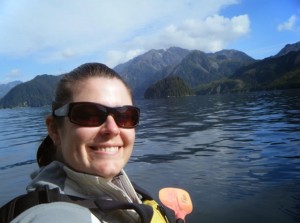
Marie-Catherine is a travel designer with Discover Holidays Inc. She graduated from Capilano University with a diploma of tourism management in 2012. Marie-Catherine says:
When I graduated, I knew that I wanted to work in travel services as a central part of the industry with touch points in every other sector, so when a posting to be a travel designer for a receptive tour operator came up, I jumped at the chance. I was excited to be working to bring clients from all over the world to Canada, and I took in every opportunity to learn about the many aspects of the company, including product, marketing, and sales.
Students wanting to get into the tour operator sector need to have a tourism education to really understand the intricacies of the sectors in the industry, as well as skills in customer service, sales, cultural practices (particularly dealing with international clients), marketing, and a real passion for the products they are selling. Teamwork is crucial on our small team, as is being intrinsically motivated to provide the best experience for clients.
First, receptive tour operators are not travel agents, nor do they operate the tours. We work with travel agents, wholesale agents, and occasionally with clients directly. However, it is mainly a B2B model. Receptive tour operators are in a dynamic workplace, with opportunities to learn and gain experience in other sectors and fields, as well as hone customer service and sales skills.
My advice is to really take hold of every opportunity that is presented, and to never stop learning about the industry. This is a very social industry and building a large solid network can help with future opportunities. Build up your customer service experience, whether it's through front-line jobs or volunteering, and attend networking events. Schools often host or sponsor these, and students should be attending them all.
This is a really fun industry, and with so many sectors and positions available, I really believe that there is something for everyone in tourism.
Jody Young, Industry and Community Services Manager
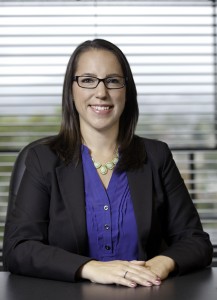
Jody works for Tourism Vancouver Island. She holds a bachelor of tourism management from Vancouver Island University (2008). Jody says:
After graduation, it took a year and a half before I got my big break into the industry. I'm thankful for the time it took for my career to really start as it provided me the opportunity to travel around Southeast Asia. I started at Tourism Vancouver Island in an entry-level position as the distribution coordinator. After just one year in the role I was promoted to industry services coordinator where I was coordinating the association's annual conference and AGM and conducting accommodation inspections. After another year and a half, I was promoted again to management level within the organization to the role I am currently in. As industry and community services manager, I oversee many portfolios for the organization such as community tourism development, event management, research, and promotion of the value of tourism.
The tourism management degree program at Vancouver Island University definitely set me up for success in this role. I highly recommend completing the four-year degree and getting as much hands-on, real-world experience that you can while completing your education. Employers will be looking for proven successes and workplace skills, not just completion of courses.
Although the tourism industry is vast with many desirable, well-paying career opportunities, it is still fairly new. The industry has room to grow on communicating that it is a key economic and social contributor to our province and country.
I would advise students to jump at an entry-level opportunity as it will be your door to advancing in your career in a particular organization. Once you've got your foot in the door, demonstrate your ability and you will soon find bigger opportunities presented to you. If I didn't take the entry-level opportunity that was presented to me, I wouldn't be in the role I am in today.
Students can get ahead by taking advantage of student rates at industry events. By attending these industry events you will rub shoulders with the folks who are at the top of the game in this industry and meeting potential future employers. Look for opportunities for mentorship programs or internships to gain that workplace experience as well.
Conclusion
As you can see, successful tourism and hospitality careers depend on reaching out and meeting people (networking), gaining practical experience, having a great attitude and work ethic, and committing to ongoing learning about the world, the industry, and yourself.
With diligence and a sense of exploration, you can launch your dream career in tourism and hospitality, today. Remember that career planning is an ongoing process — the more you practise the steps in this chapter, the more likely your success.
Now that you've explored the five sectors of tourism, special considerations, and your own place in the industry, it's time to deepen your understanding. Chapter 14, on globalization and trends, will help you appreciate the big picture of tourism and hospitality.
- Career planning: a series of deliberate steps with outcomes to help individuals achieve their short- and long-term career goals
- Conflict management: the practice of being able to identify and handle conflicts sensibly, fairly, and efficiently
- Co-op education: a special program offered by a college/university in which students alternate work and study, usually spending a number of weeks in full-time study and a number in full-time employment away from the campus
- Experiential learning: learning that takes place when a student directly participates in experiences designed for a learning purpose; takes place both inside and outside of the classroom, and involves reflection as well as action
- Hidden job market: employment opportunities that aren't posted through traditional channels, but rather arise because of a person's connections and relationships
- Informational interview: a short appointment where you learn about an employer, or a specific role, from someone already established in the field
- Internship: short-term, supervised work experience in a student's field of interest for which the student may earn academic credit
- Networking: creating relationships within a sector for the purpose of enhancing and developing one's professional identity
- Organizational culture: ways of acting, values, and beliefs shared within an organization
- Personal attributes:describe what you are like as a person/employee, such as your attitude, personality type, and so on
- Practicum:practical experiences outside the classroom supported by professionals in a workplace environment
- Self-assessment: informal and formal methods of gathering information about yourself to make career decisions
- Service learning: course-based, credit-bearing educational experience in which students participate in organized service that meets community needs and reflect on the service
- Technical skills:skills and knowledge required to perform specific work
- Transferable skills: skills required to perform a variety of tasks that can be transferred from one type of job to another
- Values: an individual's ways of living and making decisions that are congruent with his or her beliefs and principles
- Volunteering:performing a service without pay in order to obtain work experience, learn new skills, meet people, contribute to community, and contribute to a cause
- Describe the steps of career planning.
- Identify your technical and transferable skills, and personal attributes.
- Share your draft resume and cover letter with a trusted classmate, friend, or family member. What feedback do they have for you? What did you do well, and what needs improving?
- The act of creating professional relationships is referred to as_________________.
- List the ways job seekers connect to potential employment opportunities.
- Based on your career plan, identify additional training, development, and continued learning you will need for professional success.
- Define experiential learning. What are the common types of experiential learning options?
- Why is it important to understand an organization's culture and social norms?
- What are the steps in conflict management resolution? Think back to a recent dispute you have had. How might these steps have changed the outcome?
- Pick one success story that resonates with you. What are three key things you learned from the experience you have read about?
References
Bringle, R.G., & Hatcher, J.A. (1995). A service-learning curriculum for faculty. Michigan Journal of Community Service Learning, 2, 112-122.
Collins English Dictionary – Complete & Unabridged 10th Edition. (2012). Organizational culture. Retrieved from http://dictionary.reference.com/browse/organizational culture
ConnectEd. (2011). Career practicum: A work-based learning strategy. [PDF] The California Center for College and Career. Retrieved from http://www.connectedcalifornia.org/direct/files/LLAWBLCareerPracticum_FINAL_10-5-11_noLLA%20logo.pdf
ContactPoint. (2014a). Experiential learning. Retrieved from http://contactpoint.ca/wikis/experiential-learning/
ContactPoint. (2014b). Co-operative education. Retrieved from http://contactpoint.ca/wikis/co-op-education/
ContactPoint. (2014c). Internship. Retrieved from http://contactpoint.ca/wikis/internship/
Iannarino, Anthony S. (n.d.). Initiative: The ability to take action proactively. Retrieved from
http://thesalesblog.com/blog/2010/01/30/initiative-the-ability-to-take-action-proactively/
LinkBC. (2014). LinkBC roundtable 2014: Dialogue cafe. [PDF] Retrieved from http://linkbc.ca/siteFiles/85/files/2014RoundtableDialogueCafeReport.pdf
Lorenzo, G., & Ittelson, J. (2005). An overview of e-portfolios. [PDF] Educause learning initiative, 1, 1-27. Retrieved from www.case.edu/artsci/cosi/cspl/documents/eportfolio-Educausedocument.pdf
Pickerell, D.A. (2014). Work search strategies. In Blythe C. Shepard and Priya S. Mani (Eds.). Career development practice in Canada: Perspectives, principles and professionalism. Toronto, ON: Canadian Education and Research Institute for Counselling (CERIC), p. 215. Retrieved from http://contactpoint.ca/wikis/volunteering/
Rosenberg McKay, D. (2014). About careers: Self assessment. Retrieved from http://careerplanning.about.com/od/selfassessment/g/def_selfassess.htm
Shepard, B. & Mani, P. (2013).Career development practice in Canada: Perspectives, principles and professionalism. Toronto, ON: Canadian Education and Research Institute for Counselling (CERIC).
Attributions
Figure 13.1 VIU diploma winners by LinkBC is used under a CC-BY 2.0 license.
Figure 13.2Green Resume CV & Business Card by buyalex is used under a CC-BY 2.0 license.
Figure 13.3 006 LinkBC Student-Industry Rendezvous 2013 by LinkBC is used under a CC BY 2.0 license.
Figure 13.4 West Coast Sightseeing's booth by LinkBC is used under a CC-BY-NC-SA 2.0 license.
Figure 13.5 Brock Martin by Melissa Phung for LinkBC is used under a CC-BY-NC-ND 2.0 license.
Figure 13.6 Katelyn Clarke by Vivian Kereki for LinkBC is used under a CC-BY-NC-ND 2.0 license.
Figure 13.7Anna Rowinska by Karl Rowinski for LinkBC is used under a CC-BY-NC-ND 2.0 license.
Figure 13.8 Christine McCann by Beth Pink for LinkBC is used under a CC-BY-NC-ND 2.0 license.
Figure 13.9 Cleo Corbett by Digital Dean Photography for LinkBC is used under a CC-BY-NC-ND 2.0 license.
Figure 13.10Marie-Catherine Lapointe by Marie-Catherine Lapointe for LinkBC is used under a CC-BY-NC-ND 2.0 license.
Figure 13.11 Jody Young by Landon Sveinson Photography for LinkBC is used under a CC-BY-NC-ND 2.0 license.
In Deciding How Much Of A Role The Guest Should Play In Co-producing An Experience,
Source: https://opentextbc.ca/introtourism/chapter/chapter-13-careers-and-work-experience/
Posted by: browndowerturs.blogspot.com

0 Response to "In Deciding How Much Of A Role The Guest Should Play In Co-producing An Experience,"
Post a Comment